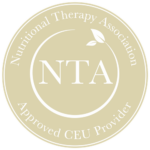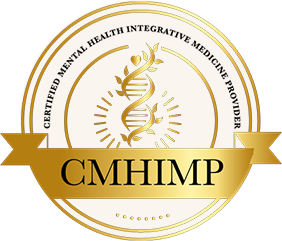
EARN 20 CE CREDITS IN NUTRITION

PROVIDE YOUR CLIENTS WITH INTEGRATIVE CARE

TAKE YOUR PRACTICE TO THE NEXT LEVEL
Your Clients are Suffering from Frustrating Symptoms Caused by Mental Health Disorders
Your clients with anxiety, depression, and other mental health problems may get some relief from medications, but the truth is that many people diagnosed with mental illness are seeking additional or alternative methods to help them feel better over the long term.
Since many medications produce side effects, the impulse to find replacements makes sense…
But thanks to “Dr. Google” and friends’ well-meaning but not so well-informed advice, millions of people are self-prescribing, and many diets and products they try can have adverse outcomes if they don’t align with their individual biological needs.
If you’re unsure of what to do because nutrition is outside your expertise, or you believe you can’t intercede in an ethical, skillful way, I want you to know that I designed this course for clinicians just like you.
Help Your Clients Navigate their Options and Sustainably Improve their Mental Health
MORE ABOUT THE COURSE

Improve Mood and Behavior
In this self-paced certification training, I trace the proven links between food and mood and teach you how numerous other holistic methods affect psychobiology. I equip you to help your clients navigate their options, steer clear of harmful methods, and sustainably improve their mental health.

Evidence-Based Approach
I’ve worked for over 40 years to develop the field of integrative medicine and nutrition for mental health. In this course, I’ll be sharing a range of safe, effective, evidence-based approaches that can help your clients optimize their well-being while addressing their mental health — whether they are anxious, depressed, or suffering from insomnia, ADHD, PTSD, or complex trauma.

Nutritional Medicine
You’ll learn to safely and ethically use integrated and nutritional medicine within your professional discipline’s scope of practice.

The Brainbow Blueprint®
My methodology, The Brainbow Blueprint®, provides a full range of options and applications of integrative medicine and nutrition for mental health. You’ll develop a full palette of nutritional and integrative medicine methods that can alleviate symptoms, working in harmony with and in some cases replacing medications.

Effective Treatment for Children, Without Pharma
By adapting complementary and alternative methods you’ll find effective treatment for children and teens with behavioral and mental health disorders such as ADHD and ODD.

Taper off Medications
Many clients do not like the side effects of the medications they take. I will guide you through creating a Taper Plan and coach you through the ethics and coordination of working with prescribers. I’ll even give you examples of how to talk to difficult prescribers.
Provide Your Clients with Personalized, Integrative Care
This rich, dynamic course prepares you to provide your clients with personalized, evidenced-based care that provides the missing link to mental health today.
I will teach you the clinical art and science of nutritional, natural, and integrative medicine to treat trauma and PTSD, depression, anxiety, insomnia, ADHD, and more.
Once you complete this course, you’ll qualify to immediately become a Certified Mental Health Integrative Medicine Provider (CMHIMP) through the Leslie Korn Institute for Integrative Medicine.

Try Before You Buy
See if this certification program is the right fit for you. Click the button to start your first lesson.
No credit card required. It’s 100% on me!
Your Course Includes:
- An invitation to join my Live Advanced Applications program (coaching and case consultation)
- Your first year of certification is FREE (a $99.99 value)
- Your exclusive listing in our Referral Network
- Practical videos and handouts to use with your clients
- Nutritional recipes for your clients
- Multiple case reviews
- Clear assessment demonstrations


"I have just completed the Mental Health Disorders certification course. Wow. Your work and teaching are exquisite, so deeply resonant with my sensibilities and interests. I'm so grateful to have come upon you on my path!”
Nadine Laughlin, APRN

"I am fascinated and inspired by your work.”
Alycia Burant, MA, LPC

"I recently completed your nutritional and integrative medicine for mental health professionals course. I absolutely loved it and am hoping to learn a lot more!"
Donya Muse, LPC

“When Dr. Korn talks, I listen. When she writes, I read.”
Jeremy Lotz, MA, LPC, NCC

“A wealth of knowledge applicable to my practice.”
Kristan Weisdack, MEd, LBS, CIMI, CMHIMP

“This was a valuable introduction for occupational therapists.”
Dr. Muzna Ahmed, OTD, OTR/L

“I am proud to have just finished your certification course on nutrition and integrative medicine.”
Dr. Lori Baudino, BC-DMT

“Your wisdom is so helpful as I work with clients."
Lisa Bartelheim, MA, LMHC, CADAC II, QPR

“I’m very inspired and excited and grateful."
Michele Ferraro, PsyD, MBA

“I cannot even put into words how appreciative I am for this program.”
Rob Wheeler, MA, LMHC

“I am loving every minute of this certification course.”
Gretchen Mead, LICSW

“Your training has given me hope and inspires me.”
Ericka Juarez, PhD

"Dr. Korn’s class took my clinical practice to another level.”
Jill Charney, MSW, LICSW

"I thoroughly enjoyed Dr. Korn’s presentation, finding it rich with information, and she, herself; absolutely delightful to listen to. Her extensive knowledge, spanning diverse areas, is offered in an impressively warm and inviting format."
Elizabeth Bergstrom, PhD, LMHC

”This knowledge has changed my life and how I now offer an integrative approach to my clients.”
Lynette Thorlakson, MFT

"The content and your teaching style helped keep me motivated and hopeful for the type of clinician I have always wanted to become.”
Dr. Dara Goldberg

"Dr. Korn’s course on Nutrition and Integrative Medicine and Mental Health Disorders is the most comprehensive program I have taken on this subject. It provides a strong foundation and tools for practice. It’s an excellent program!"
Rebecca Faulkner, MSN, PMHNP-BC, RD

"I love the work of Leslie Korn! It broke my brain! This course opened up my mind to new information that changed my life, my family’s life and allowed me to enhance the life of so many clients."
Allison Huffman, LMFT
Frequently Asked Questions
This certification course has been specially created for helping professionals, including counselors, psychologists, case managers, psychotherapists, social workers, marriage & family therapists, addiction counselors, therapists, occupational therapists, occupational therapists’ assistants, nurses, and other mental health professionals.
The education provided in this intensive online training is designed to breathe new life into your clinical treatment plans for clients who are looking for holistic approaches to health and healing.
This interactive online certification course also offers you a community of peers and mentors all focused on helping clients succeed.
There is no known commercial support nor conflict of interest for this program.
We are a Preferred Provider with the Integrative and Functional Nutrition Academy (IFNA). The certification course “Nutritional and Integrative Medicine for Mental Health” is approved for 24 Continuing Professional Education Units (CPEUs).
Once you complete your certification you may maintain this record and submit it to IFNA when required.
You may also check about submitting our certificate of completion directly for RD and Nutritional CPEUs to your local credentialing body. We encourage you to learn about your specific credentials requirements in advance.
We are a Preferred Provider with the National Association of Nutrition Professionals (NANP). The certification course, “Nutritional and Integrative Medicine for Mental Health” is approved for a total of twenty (20) NANP Category I CEUs.
Once you complete your certification you may maintain this record and submit it to NANP when required.
You may also check about submitting our certificate of completion directly for RD and Nutritional CEUs to your local credentialing body. We encourage you to learn about your specific credentials requirements in advance.
We Are a Preferred Provider with The Nutritional Therapy Association (NTA). The certification course, “Nutritional and Integrative Medicine for Mental Health” is approved for a total of twenty-four (24) health CEUs.
Once you complete your certification you may maintain this record and submit it to NTA when required.
Accessibility Policy: This program adheres to the standards of the Americans Disabilities Act. Please contact the Leslie Korn Institute for Integrative Medicine if special accommodation is required.
Grievances Policy: Leslie Korn Institute for Integrative Medicine seeks to ensure equitable treatment of every person and to make every attempt to resolve grievances in a fair manner. Please submit a written grievance to grievances_lkkim@protonmail.com. Grievances would receive, to the best of our ability, corrective action in order to prevent further problems.
Agarwal, S., Reider, C., Brooks, J. R., & Fulgoni, V. L. (2015, January 7). Comparison of prevalence of inadequate nutrient intake based on body weight status of adults in the United States: An analysis of NHANES 2001–2008. Journal of the American College of Nutrition. Retrieved May 2015, from here
Chedid, V., Dhalla, S., Clarke, J. O., Roland, B. C., Dunbar, K. B., Koh, J., … Mullin, G. E. (2014). Herbal therapy is equivalent to rifaximin for the treatment of small intestinal bacterial overgrowth. Global Advances in Health and Medicine, 3(3), 16–24. Doi:10.7453/gahmj.2014.019.
Chu, J. A. (2011). Rebuilding shattered lives: Treating complex PTSD and dissociative disorders (2nd ed.). Hoboken, NJ: Wiley.
Ahmadi, N., Hajsadeghi, F., Mirshkarlo, H. B., Budoff, M., Yehuda, R., & Ebrahimi, R. (2011). Post-traumatic stress disorder, coronary atherosclerosis, and mortality. American Journal of Cardiology, 108 (1), 29–33
Abu-Taweela, G. M., Zyadah, M. A., Ajarem, J. S., & Ahmad, M. (2014). Cognitive and biochemical effects of monosodium glutamate and aspartame, administered individually and in combination in male albino mice. Neurotoxicology and Teratology, 42(2014), 60–67.
Andersen, T.E., Ellegaard, H., Schiøttz-Christensen, B., Mejldal, A., & Manniche, C. (2020) Somatic Experiencing® for patients with low back pain and comorbid posttraumatic stress symptoms – a randomised controlled trial, European Journal of Psychotraumatology, 11:1, DOI: 10.1080/20008198.2020.1797306
Bayer, L., Constantinescu, I., Perrig, S., Vienne, J., Vidal, P. P., Mühlethaler, M., & Schwartz, S. (2011). Rocking synchronizes brain waves during a short nap. Current Biology, 21 (12), R461–R462.
Bergmans, R. S., & Malecki, K. M. (2017). The association of dietary inflammatory potential with depression and mental well-being among U.S. adults. Preventive medicine, 99, 313–319. https://doi.org/10.1016/j.ypmed.2017.03.016
Boss, L., Branson, S., Hagan, H., & Krause-Parello, C. (2019). A Systematic Review of Equine-Assisted Interventions in Military Veterans Diagnosed with PTSD. Journal of Veterans Studies, 5(1), 23–33. DOI: http://doi.org/10.21061/jvs.v5i1.134
Bredesen, D. E. (2014). Reversal of cognitive decline: A novel therapeutic program.
Aging, 6(9), 707–717.
Chen, X., Redline, S., Shields, A. E., Williams, D. R., & Williams, M. A. (2014). Associations of allostatic load with sleep apnea, insomnia, short sleep duration, and other sleep disturbances: Findings from the National Health and Nutrition Examination Survey. Annals of Epidemiology, 24(8), 612–619.
Chopin, S. M., Sheerin, C. M., & Meyer, B. L. (2020). Yoga for warriors: An intervention for veterans with comorbid chronic pain and PTSD. Psychological Trauma: Theory, Research, Practice, and Policy, 12(8), 888–896. https://doi.org/10.1037/tra0000649
Dutheil, F., Mondillon, L., & Navel, V. (2020). PTSD as the second tsunami of the SARS-Cov-2 pandemic. Psychological Medicine, 1-2. doi:10.1017/S0033291720001336 Exley, C. (2014). Why industry propaganda and political interference cannot disguise the inevitable role played by human exposure to aluminium in neurodegenerative diseases, including Alzheimer’s disease. Frontiers in Neurology, 5, 212. doi:10.3389/fneur.2014.00212
Ferguson L.R. De Caterina, R., Gorman, U. et al. Guide and Position of the International Society of Nutrigenetics/Nutrigenomics on Personalised Nutrition: Part 1—Fields of precision nutrition. Nutrigenetics Nutrigenomics. 2016; 9: 12-27
Frost, G., Sleeth, M. L., Sahuri-Arısoylu, M., Lizarbe, B., Cerdan, S., Brody, L., … Bell, J. D. (2014). The short-chain fatty acid acetate reduces appetite via a central homeostatic mechanism. Nature Communications, 5, 3611.
Harris, C.B., Chowanadisai, W., Mishchuk, D.O., Satre, M. A., Slupsky, C.M., & Rucker, R.B. (2013). Dietary pyrroloquinoline quinone (PQQ) alters indicators of inflammation and mitochondrial-related metabolism in human subjects. Journal of Nutritional Biochemistry, 24(12), 2076–2084.
Hilton, Lara, G., Libretto, S., Xenakis, L., Elfenbaum, P., Boyd, C., Zhang, W., & Clark, A.A. (2109). Evaluation of an Integrative Post-Traumatic Stress Disorder Treatment Program. The Journal of Alternative and Complementary Medicine 2019 25:S1, S147-S152
Hindocha, C., Cousijn, J., Rall, M., & Bloomfield, M.A.P. (2020). The Effectiveness of Cannabinoids in the Treatment of Posttraumatic Stress Disorder (PTSD): A Systematic Review, Journal of Dual Diagnosis, 16:1, 120-139, DOI: 10.1080/15504263.2019.1652380
Iliades, C. (2014). How stress affects digestion. Everyday Health. Retrieved May 2015, from http://www.everydayhealth.com/health-report/better-digestion/how-stress-affects-digestion.aspx
Jefferson, T., Jones, M.A., Doshi, P., Del Mar, C. B., Hama, R., Thompson, M.J., Heneghan, C.J. (2014). Neuraminidase inhibitors for preventing and treating influenza in healthy adults and children. Cochrane Database of Systemic Reviews, 10(4), CD008965. doi:10.1002/14651858.CD008965.pub4.
Korn, L.E. (2012). Rhythms of Recovery: Trauma, Nature, and the Body. Routledge.
Korn, L.E. ( 2016) Nutrition Essentials for Mental Health, Norton, N.Y. 2019
Lemer, P. (2014). Outsmarting autism. Tarentum, PA: Word Association Publishers.
Loflin, M., & Earleywine, M. (2014). A new method of cannabis ingestion: The dangers of dabs? Addictive Behaviors, 39(10), 1430–1433.
McNamara, D.J. (2014). Dietary cholesterol, heart disease risk and cognitive dissonance. Proceedings of the Nutrition Society, 73(2), 161–166. doi:10.1017/S0029665113003844.
Mitchell, C., Hobcraft, J., McLanahan, S.S., Siegel, S.R., Berg, A., Brooks-Gunn, J., Notterman, D. (2014). Social disadvantage, genetic sensitivity, and children’s telomere length. Proceedings of the National Academy of Sciences USA, 111(16), 5944-5949.
Muraki, M., Fujiwara, Y., Machida, H., Okazaki, H., Sogawa, M., Yamagami, H., Arakawa, T. (2014). Role of small intestinal bacterial overgrowth in severe small intestinal damage in chronic nonsteroidal anti-inflammatory drug users. Scandinavian Journal of Gastroenterology, 49(3), 267–273. doi:10.3109/00365521.2014.880182.
Mushtaq S., Mazhar H., Khalid S., et al. Role of nutrition in depression. J Psychol Clin Psychiatry. 2020;11(5):127‒135. DOI: 10.15406/jpcpy.2020.11.00686
Pasula, M.J. (2014, January). The patented mediator release test (MRT): A comprehensive blood test for inflammation caused by food and food-chemical sensitivities. Townsend Letter.
Quinones, M.M., Gallegos, A.M., Lin, F.V. et al. Dysregulation of inflammation, neurobiology, and cognitive function in PTSD: an integrative review. Cogn Affect Behav Neurosci 20, 455–480 (2020). https://doi.org/10.3758/s13415-020-00782-9
Gangamma, R., Tor, S., Whitt, V., Hollie, B., Gao, Q., Stephens, A., Hutchings, R., & Stone Fish, L. (2020). Perceived Discrimination as a Mediator of ACEs and Psychological Distress, The American Journal of Family Therapy, DOI: 10.1080/01926187.2020.1813656
Blampied, M., Bell, C., Gilbert, C., Rucklidge, J.J (2020).. Broad spectrum micronutrient formulas for the treatment of symptoms of depression, stress, and/or anxiety: a systematic review. Expert Rev Neurother. 2020 Apr;20(4):351-371. doi: 10.1080/14737175.2020.1740595. PMID: 32178540.
Sarris, J., Ravindran, A., Yatham, L.N., Marx, W., Rucklidge, J.J., McIntyre, R.S., Akhondzadeh, S., Benedetti, F., Caneo, C., Cramer, H., Cribb, L., de Manincor, M., Dean, O., Deslandes,. A.C., Freeman, M.P., Gangadhar, B., Harvey, B.H., Kasper, S., Lake, J., Lopresti, A., Lu, L., Metri, N.J., Mischoulon, D., Ng, C.H., Nishi, D., Rahimi, R., Seedat, S., Sinclair, J., Su, K.P., Zhang, Z.J., Berk, M. (2022). Clinician guidelines for the treatment of psychiatric disorders with nutraceuticals and phytoceuticals: The World Federation of Societies of Biological Psychiatry (WFSBP) and Canadian Network for Mood and Anxiety Treatments (CANMAT) Taskforce. World J Biol Psychiatry. 2022 Mar 21:1-32. doi: 10.1080/15622975.2021.2013041. Epub ahead of print. PMID: 35311615.
Singh, K., Connors, S.L., Macklin, E.A., Smith, K.D., Fahey, J.W., Talalay, P., & Zimmerman, A.W. (2014). Sulforaphane treatment of autism spectrum disorder (ASD). Proceedings of the National Academy of Sciences USA, 111(43), 15550–15555. doi: 10.1073/pnas.1416940111.
Stevens, A.J., Purcell, R.V., Darling, K.A., Eggleston, M.J.F., Kennedy, M.A., Rucklidge, J.J. (2020). Author Correction: Human gut microbiome changes during a 10 week Randomised Control Trial for micronutrient supplementation in children with attention deficit hyperactivity disorder. Sci Rep. 2020 Jan 21;10(1):1180. doi: 10.1038/s41598-020-58141-0. Erratum for: Sci Rep. 2019 Jul 12;9(1):10128. PMID: 31959984; PMCID: PMC6971235.
1. Assess the scientific research that links diet and nutrition to mental illness and its implications for treatment.
2. Demonstrate incorporation of ethical and scope of practice considerations relative to integrated and nutritional medicine with respect to your own professional discipline.
3. Prepare to interview clients using the DSM-5™ Cultural Formulation tool to explore health and healing in order to inform the treatment planning process.
4. Demonstrate the use of a food-mood assessment to evaluate client eating patterns and how those patterns may influence their mental health.
5. Describe reframing client self-shame statements regarding their dietary habits.
6. Discuss the science of circadian rhythm as it contributes to depression, PTSD, and bipolar disorder.
7. Explain the psychobiology and psychophysiology of mind and body interactions with reference to seven DSM™ categories.
8. Describe stage-specific anaerobic and aerobic exercise and client self-care methods to decrease dissociative symptoms in clients.
9. Demonstrate breathing techniques to reduce hyperventilation and improve focus among clients with anxiety disorders.
10. Describe integrative and nutritional methods for digestion as they relate to client psycho-education.
11. Analyze the science for the “second brain,” the gut-brain axis communication system of neurotransmitters.
12. Identify six culinary methods for treating clients who present with mood lability.
13. Describe adaptations of culinary methods for children and teens with behavioral and mental health disorders such as ADHD and ODD.
14. Identify the evidence for the use of fats in the diet for anxiety and depression.
15. Assess the value of the epidemiological research underlying the benefits of the Mediterranean diet and its specific application for client mental health.
16. Explain how certain micronutrients and macronutrients affect mood and behavior in clients.
17. Describe the correlation of gluten and casein sensitivity with the presentation of depression, psychosis, and ASD in clients.
18. Assess drug-nutrient-herbal interactions for clients in order to prevent side effects of polymedicine use.
19. Discuss contraindications of the use of psychotropic medications, herbal medicines, and nutrients.
20. Explain the endocannabinoid system and the ratio of THC : CBD in mental health and pain disorders.
21. Define the benefits of therapeutic massage therapy and bodywork as an adjunct to psychotherapy.
22. Compare and contrast bodywork and acupuncture and when a referral might be appropriate for the treatment of complex trauma
23. Examine the research on cranial electrical stimulation for insomnia, depression, and PTSD.
24. Define the glymphatic system and its role in clearing plaque and tau proteins from the brain.
25. Describe evidence-based protocols for nutritional and herbal approaches for seven DSM-5™ categories.
26. Identify 6 nutritional methods for treating clients who present with mood lability.
Certification is easy and simple. Start with completing one of my three certification programs. As a licensed provider, once you successfully complete a program and achieve a minimum of 75% on the post-test, you may submit your application for certification here.
It’s free for the first year.
If you are not licensed but believe that your background and work qualify you for certification, we offer an alternative pathway by which to apply. Use the same process above; in the application form, you will be asked to upload additional supporting materials.
And of course, our staff is available to support your application submission should any questions arise; just contact us.
There are options to work with me directly.
You may choose a Health Consultation for your own health and to see how to conduct the Brainbow Blueprint® model in practice.
I also offer Practice Building and Career Counseling to think through your career goals in integrative medicine and nutrition for mental health.
Whatever way you prefer to connect with me, know that I am passionate about supporting you and your personal and professional goals!
You can start the course immediately! It is a completely self-paced online course — you decide when you start and when you finish. Once you have completed the course you can claim CE credits and apply for your free certification.
How does lifetime access sound? After enrolling, you have unlimited access to this course for as long as you like — across any and all devices you own.
If you are not 100% satisfied with this course you may send an email and you will be provided with a full refund, no questions asked. The reimbursement given will be minus taxes and fees paid.
You really want to help your clients who are suffering from frustrating symptoms caused by mental health disorders…

The Curriculum Covers In-Depth…
- How food affects mental health
- 6 nutritional methods for treating clients who present with mood lability
- How to define your scope of practice and ethical issues
- How to use evidence-based protocols for nutritional and herbal approaches for six DSM-5™ categories
- Specific use of yoga and exercise to address trauma and anxiety and to decrease dissociative symptoms
- The scientific research that links diet and nutrition to mental illness and its implications for treatment
- The Second Brain: apply specific interventions to bring the gut-brain axis into harmony
- How to apply a simple psycho-educational method to assess food and mood
- How to analyze the differences between mental illness versus nutritional and hormonal imbalances
- Hypoglycemia and Mood: how to address sugar addiction and impact of blood sugar on mood in children
- Drug-Nutrient-Herb Interaction: make safe suggestions using assessment software
- The principles of psychotropic tapering with nutrients and herbs
- Breathing techniques to reduce hyperventilation, improve focus and enhance sleep
- How certain micronutrients and macronutrients affect your client’s moods and behaviors
- Effective treatment for children & teens with developmental trauma, ADHD, and ODD
- How to use the psychobiology and psychophysiology of mind and body to optimize your work
- How to use the DSM-5™ Cultural Formulation tool to enhance cultural competency and engage client rapport
- How to apply mindfulness methods in the treatment of eating disorders
- Essential Fatty Acids: the correct dosages and types of fats
- How hormones affect PTSD, depression and insomnia
- Circadian Rhythm: techniques to improve depression, SAD, PTSD, and bipolar disorder
What’s My Investment
COURSE & CERTIFICATION
$199
$999
Join the 35,000+ professionals who completed Dr. Korn’s certification programs
I’VE BEEN FEATURED, INTERVIEWED, OR PROFILED IN:







Course Description
I developed this certification in response to my students, who often ask me, “How do I incorporate your methods into my practice?” “How can I do what YOU do?”
This rich, dynamic course prepares you to provide your clients with personalized, evidenced-based care that provides the missing link to mental health today.
I will teach you the clinical art and science of nutritional, natural and integrative medicine to treat trauma and PTSD, depression, anxiety, insomnia, ADHD and more, all with methods proven to improve mood and mental health.
This certification training delivers state-of-the-art methods, including trauma-informed assessments and interventions, nutritional psychology, yoga, herbal medicine, detoxification, and so much more. I will teach you how to navigate the complex relationship between what we eat and how it affects the way we think, feel, and interact with the world.
Following certification, you become eligible to attend my Advanced Applications of Integrative Medicine for Mental Health. I teach this course live, online. We meet in a small group on a monthly basis to explore advanced methods, new interventions and do case review with live discussion. (For graduates only.)
Our clients want to have more balanced moods, reduce insomnia and anxiety, get off medications with side effects, and do so, naturally. Our clients want help with ADHD, focus, panic attacks, seasonal affective disorder, and Bipolar.
I give you the tools and language to treat, educate, support client change, talk with other providers, and make appropriate referrals.
In this course I guide you step-by-step, using dynamic lectures, demonstrations, handouts, and real Q&A sessions as you learn to become a Certified Mental Health Integrative Medicine Provider.
My goal? To support you to become a Mental Health Integrative Medicine Provider and create a satisfying career by helping your clients. And in the process, you will enhance your own health as well!

Your Instructor
Dr. Leslie Korn is a renowned expert in integrative medicine for the treatment of trauma and its physical sequelae including chronic digestive illness, insomnia, pain, substance abuse, diabetes, cognitive decline and “unexplained illnesses.” She has provided over 65,000 hours of clinical care integrating psychotherapy and somatic therapies with nutritional, culinary, and herbal medicine. She completed her training at Harvard Medical School and The Harvard School of Public Health. She is licensed and board certified in 4 clinical disciplines.
She has been a faculty instructor at Harvard in the department of psychiatry and faculty at 2 Naturopathic medical schools. She lived for 25 years in the jungle of Mexico, where she worked alongside indigenous healers and directed a pro bono health center. Her clinical practice focuses on helping clients who are ill by restoring their health and reducing or eliminating medications.
Her mentoring practice focuses on helping clinicians create a successful, integrative medicine, trauma-informed career. Her ethic of compassion and care is informed by feminist values of social justice and her love for dogs.
Licensure: LMHC, MA. Lic #3214, exp. 12/2023; NPI: 1629659636
The Leslie Korn Institute For Integrative Medicine is neither a regulatory nor licensing organization and therefore not sanctioned to certify, license, or otherwise bestow the legal authorization to practice as a nutritionist, physician, or mental health professional. Certification does not warrant that a program or its examination certifies a candidate’s competence. Nothing about this program or its examination is intended to replace, override, or conflict with licensing requirements for health professionals and their requirements for practice in their state of residency and practice.












